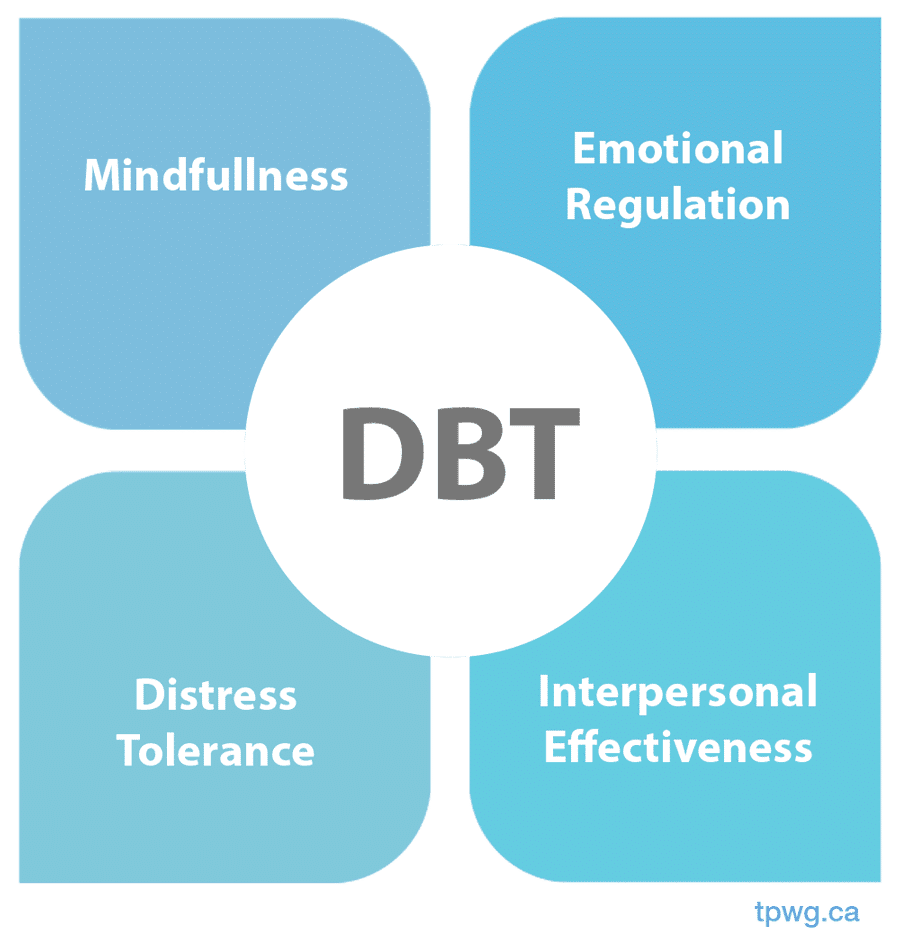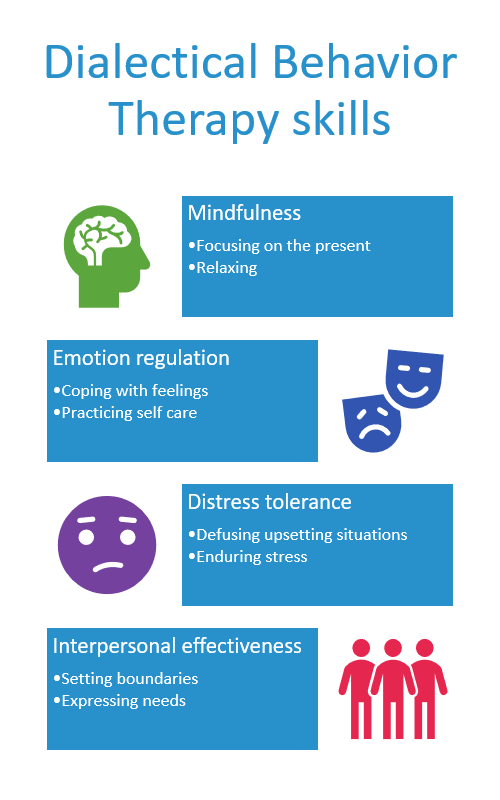Empowering Individuals Via Reliable Dialectical Behavior Therapy (DBT) Solutions: Building Stronger Mental Health And Wellness Foundations
In the realm of psychological wellness and health, the value of empowering individuals with efficient Dialectical Practices Treatment (DBT) solutions can not be overemphasized. By concentrating on the core concepts of DBT, such as improving psychological law abilities, boosting interpersonal performance, building distress resistance techniques, and cultivating mindfulness methods, individuals can begin on a journey towards building stronger mental health foundations.
Comprehending the Core Principles of DBT


One core concept of DBT is validation. Therapists using DBT acknowledge the person's sensations and actions as valid actions to their environment. This validation assists develop a solid healing partnership and motivates people to work in the direction of change. Another essential aspect is dialectics, which teaches individuals to check out scenarios from numerous viewpoints and discover the synthesis in between conflicting ideas or emotions.
In addition, the principle of dialectical abstinence is central to DBT. This concept urges individuals to avoid self-destructive actions while additionally accepting themselves. By recognizing and including these core principles, specialists can successfully apply DBT methods and assistance individuals in their journey in the direction of psychological law and psychological health.
Enhancing Psychological Policy Abilities
Creating effectiveness in managing feelings is an essential element of fostering psychological well-being and interpersonal efficiency - DBT London. Enhancing emotional law abilities is a core element of Dialectical Practices Treatment (DBT) that furnishes people with the tools to navigate extreme feelings in a useful and healthy way. Through DBT, people learn to recognize, comprehend, and control their feelings, leading to enhanced psychological health outcomes
DBT highlights the value of mindfulness, which includes being present in the minute without judgment. This practice enables people to observe their feelings without becoming overwhelmed by them, improving their capacity to react efficiently as opposed to react impulsively. By cultivating mindfulness, individuals can establish a higher feeling of self-awareness and psychological control.
Additionally, DBT instructs useful abilities such as distress resistance and feeling law techniques to aid people take care of challenging feelings. By learning these skills, individuals can lower spontaneous behavior, boost decision-making, and enhance their partnerships with others. Ultimately, boosting emotional policy skills via DBT encourages people to lead even more fulfilling and balanced lives.

Improving Interpersonal Effectiveness
Having developed a solid foundation in emotional law skills within the structure of Dialectical Practices Treatment (DBT), the emphasis now shifts in the direction of enhancing social effectiveness. Improving interpersonal performance is a vital element of DBT as it equips people with the essential skills to browse social communications, communicate efficiently, established boundaries, and develop much healthier connections.
In DBT, social effectiveness skills are shown via components that concentrate on locations such as assertiveness, effective communication, and social analytical. By discovering these skills, people can improve their ability to share their wishes and demands, keep self-esteem, and construct stronger links with others.
Practicing mindfulness is an important component of enhancing interpersonal performance within the DBT structure. Mindfulness enables individuals to be existing in their interactions, listen proactively, and respond attentively as opposed to react impulsively. By incorporating mindfulness into their lives, people can cultivate higher self-awareness and psychological regulation, which are vital for effective interpersonal interactions.
Building Distress Tolerance Methods
Checking out reliable methods for taking care of emotional distress is necessary for individuals seeking to improve their coping skills and strength. Structure distress resistance techniques is an essential aspect of Dialectical Practices Therapy (DBT) that equips people to navigate tough emotions without becoming overloaded.
Additionally, mindfulness practices play a considerable role in structure distress resistance. Mindfulness motivates individuals to stay existing in the minute without judgment, permitting them to observe their ideas and emotions without reacting impulsively. This understanding allows people to tolerate distress much more successfully and create a higher sense of control over their reactions.
Along with these strategies, creating a tailored distress resistance plan with the advice of a qualified specialist can give individuals with a tailored strategy to taking care of psychological distress - DBT London. By incorporating these techniques right into life, individuals can reinforce their mental health foundations and enhance their total wellness
-p-800.png)
Cultivating Mindfulness Practices
To deepen their distress tolerance methods further, individuals can concentrate on growing mindfulness methods as a corresponding technique within the framework of Dialectical Practices Therapy (DBT) Mindfulness, a vital component of DBT, entails focusing on today minute without judgment. By promoting mindfulness, people can improve their awareness of thoughts, feelings, and bodily sensations, advertising a deeper understanding of themselves and their experiences.
Mindfulness practices in DBT include techniques such as mindful breathing, body scans, and observing ideas without accessory. These methods urge individuals read what he said to create a non-reactive position towards their internal experiences, allowing them to reply to challenging circumstances with greater clarity and calmness. By integrating mindfulness right into everyday regimens, individuals can learn to regulate their emotions better, decrease spontaneous habits, and cultivate a sense of internal tranquility.
Via cultivating mindfulness techniques, individuals undertaking DBT can develop a solid foundation for handling stress and anxiety, improving relationships, and improving general well-being. By integrating mindfulness into their restorative journey, individuals can create important skills that empower them to browse life's challenges with strength and self-awareness.
Conclusion
Finally, effective Dialectical Behavior Treatment (DBT) services play an important function in empowering people to build more powerful mental health and wellness foundations. By recognizing the core principles of DBT, boosting emotional regulation abilities, boosting interpersonal efficiency, constructing distress resistance methods, and cultivating mindfulness methods, people are equipped with the needed tools to browse their emotions, relationships, and obstacles in an extra durable and flexible way. DBT solutions provide an extensive method to advertising psychological official statement well-being and encouraging people to lead meeting lives.
By concentrating on the core principles of DBT, such as enhancing emotional guideline skills, improving social effectiveness, constructing distress tolerance strategies, and cultivating mindfulness techniques, people can begin on a journey in the direction of structure more powerful mental wellness structures. Enhancing emotional guideline skills is a core component of Dialectical Practices Therapy (DBT) that equips individuals with the tools to navigate extreme emotions in a healthy and balanced and constructive way.In addition, DBT educates useful abilities such as distress tolerance and emotion policy methods to assist individuals take care of challenging feelings.To grow their distress tolerance strategies even more, people can concentrate on cultivating mindfulness techniques as a corresponding approach within the framework of Dialectical Behavior Therapy (DBT) By understanding the core concepts of DBT, boosting psychological policy abilities, improving social effectiveness, developing distress resistance strategies, and cultivating mindfulness methods, individuals are furnished with the essential tools visit this site right here to browse their emotions, relationships, and difficulties in an extra flexible and resistant way.